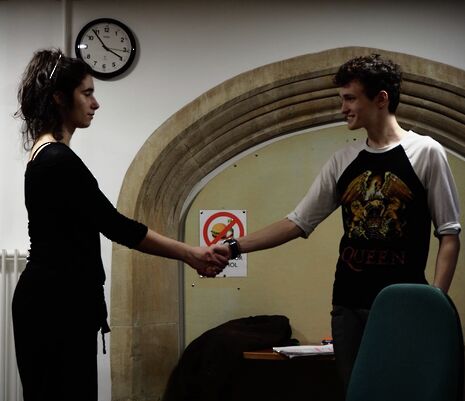A Glitch in My Code preview
This student written piece explores iconic science fiction themes in an intimate, humanising setting.

A Glitch In My Code is an exciting piece of new writing centred around a theme we rarely encounter in student theatre: the implications of artificial intelligence. I attended a rehearsal between writer-director Anna Shmatenko and her three actors, who portray two human friends whose relationship comes under fire with the arrival of a humanoid robot. What seems at first to be a fast-paced and conversational comedy of relationships soon reveals itself as a more ambitious project due to its fascinating exploration of the eerie world of A. I.
"A Glitch In My Code is about humanising the robotic, the unearthly and the downright alien."
I wondered what inspired Shmatenko to write on this subject, already revisited countless times in blockbusters like The Matrix, Blade Runner or the eponymous A. I. Artificial Intelligence. She points out (quite fairly) that her piece already differs from these in its medium, exploring themes much more rarely explored on stage. It is true that we so rarely think of sci-fi in the context of stage drama, though the word “robot” was originally introduced to the English language through theatre, appearing in Karl Capek’s 1920 play Rossum’s Universal Robots – so there is a sense of returning full circle through the choice of medium. Films relying on cutting-edge CGI predominantly conceive of A. I. as a vehicle to create visions of dystopia where machines have taken over the Earth, Shmatenko continues, while A Glitch In My Code is about humanising the robotic, the unearthly and the downright alien. She adds that it is quite likely we will face questions about ethical and ontological claims of humanoids in our lifetimes.
The play, set in what is for its writer a foreseeable future, follows a young man called Ian (David Barton) who buys an android out of pure curiosity. The android Felix (Lara Cosmetatos) is programmed to copy the people around him to seem more human to them, yet, due to the titular “glitch” in its coding, truly begins developing feelings and identity, essentially human characteristics. Ian wants to see how long it will take his friend Alice (Sophie Challonder) to figure out Felix is a robot, with things growing out of hand when Alice believes he is human and starts to grow attached.
I asked Cosmetatos what it must be like to play a character who is by design “other” and inhuman. She admits both the character and her process are complex in their paradoxes. Felix starts off as a smooth butler, impeccable, unnaturally controlled and perfect; and she sees his metamorphosis into a human almost as an experience of childhood, growing curious, discovering his likes and dislikes, becoming able to feel and to fake. She adds that the whole experience was strangely humanising, while Barton shares that the rehearsal process was at times actually scary – especially in moments where Lara copied his every move with utmost precision.
The intimate space of the Playroom perfectly fits the show’s attempt at humanising A. I. – as I watched the actors rehearse their scene I actually found myself sympathising with a robot. “I want to be alive just like you”, says Felix to Ian in one of the play’s most moving scenes. Whether he is actually alive or not is a question Ian struggles to answer. Shmatenko invites us to wonder what it means to be human through the encounter with a strange mirror-being, at once more and less than so: more intelligent, less … well, what, exactly? This dilemma, masked by the light, witty tone of the dialogue, is the driving force of the play. A Glitch In My Code promises to be an absorbing mix of inventive comedy and thought-provoking drama which is not to be missed.
 News / Uni Scout and Guide Club affirms trans inclusion 12 December 2025
News / Uni Scout and Guide Club affirms trans inclusion 12 December 2025 News / Cambridge Vet School gets lifeline year to stay accredited28 November 2025
News / Cambridge Vet School gets lifeline year to stay accredited28 November 2025 News / Cambridge study finds students learn better with notes than AI13 December 2025
News / Cambridge study finds students learn better with notes than AI13 December 2025 Science / Did your ex trip on King’s Parade? The science behind the ‘ick’12 December 2025
Science / Did your ex trip on King’s Parade? The science behind the ‘ick’12 December 2025 News / Pembroke to convert listed office building into accom9 December 2025
News / Pembroke to convert listed office building into accom9 December 2025








